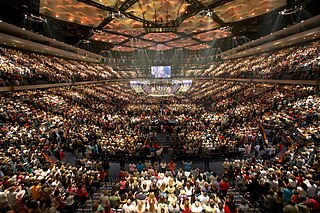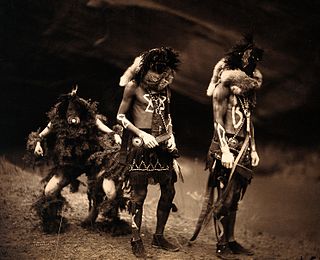Related Research Articles

Modern paganism, also known as contemporary paganism and neopaganism, is a collective term for religions influenced by the various historical pre-Christian beliefs of pre-modern peoples in Europe and adjacent areas of North Africa and the Near East. Although they share similarities, contemporary Pagan movements are diverse, and do not share a single set of beliefs, practices, or texts. Scholars of religion characterise these traditions as new religious movements. Most academics who study the phenomenon treat it as a movement that is divided into different religions; others characterize it as a single religion of which different Pagan faiths are denominations.

Pentecostalism or classical Pentecostalism is a Protestant Charismatic Christian movement that emphasizes direct personal experience of God through baptism with the Holy Spirit. The term Pentecostal is derived from Pentecost, an event that commemorates the descent of the Holy Spirit upon the Apostles and other followers of Jesus Christ while they were in Jerusalem celebrating the Feast of Weeks, as described in the Acts of the Apostles.

Secular humanism is a philosophy, belief system or life stance that embraces human reason, secular ethics, and philosophical naturalism while specifically rejecting religious dogma, supernaturalism, and superstition as the basis of morality and decision making.

Unitarian Universalism (UU) is a liberal religion characterized by a "free and responsible search for truth and meaning". Unitarian Universalists assert no creed, but instead are unified by their shared search for spiritual growth, guided by a dynamic, "living tradition". Currently, these traditions are summarized by the Six Sources and Seven Principles of Unitarian Universalism, documents recognized by all congregations who choose to be a part of the Unitarian Universalist Association. These documents are "living", meaning always open for revisiting and reworking. Unitarian Universalist (U.U.) congregations include many atheists, agnostics, and theists and have churches, fellowships, congregations, and societies around the world. The roots of Unitarian Universalism are in protestant liberal Christianity, specifically unitarianism and universalism. Unitarian Universalists state that from these traditions comes a deep regard for intellectual freedom and inclusive love. Congregations and members seek inspiration and derive insight from all major world religions.

A chaplain is, traditionally, a cleric, or a lay representative of a religious tradition, attached to a secular institution, or a private chapel.
The Christian left is a range of left-wing Christian political and social movements that largely embrace social justice principles and uphold a social doctrine or social gospel.

Interfaith dialogue refers to cooperative, constructive, and positive interaction between people of different religious traditions and/or spiritual or humanistic beliefs, at both the individual and institutional levels. It is distinct from syncretism or alternative religion, in that dialogue often involves promoting understanding between different religions or beliefs to increase acceptance of others, rather than to synthesize new beliefs.

Christianity is the most widely professed religion in the United States, with Protestantism being its largest branch, although its share of the total population has been declining to varying degrees. A large variety of faiths have historically flourished within the country. The United States is a substantial outlier among other highly developed countries: uniquely combining a high level of religiosity and wealth, although this has lessened somewhat since the early 1990s. In one 2020 survey, about 65% of Americans report that religion plays an important or very important role in their lives, 43% report attending religious services at least monthly, and 68% report praying daily or weekly. Surveys from the same period found that 28% to 32% of Americans were atheist, agnostic or "nothing in particular", proportions which have been growing in recent years. Freedom of religion in the United States is guaranteed in the First Amendment to the United States Constitution.

Tablighi Jamaat is a transnational Deobandi Islamic missionary movement that focuses on exhorting Muslims to be more religiously observant and encouraging fellow members to return to practising their religion as per the Islamic prophet Muhammad, and secondarily give dawah (calling) to non-Muslims. "One of the most widespread Sunni" islah (reform) and daʿwa (missionary) organizations "in the world today", and called "one of the most influential religious movements in 20th-century Islam," the organisation is estimated to have between 12 and 80 million adherents worldwide, in over 150 countries, with the majority living in South Asia.

James E. Wallis Jr. is an American theologian, writer, teacher and political activist. He is best known as the founder and editor of Sojourners magazine and as the founder of the Washington, D.C.-based Christian community of the same name. Wallis is well known for his advocacy on issues of peace and social justice. Although Wallis actively eschews political labels, he describes himself as an evangelical and is often associated with the evangelical left and the wider Christian left. He worked as a spiritual advisor to President Barack Obama. He is also a leader in the Red-Letter Christian movement.
Spiritual Assembly is a term given by ʻAbdu'l-Bahá to refer to elected councils that govern the Baháʼí Faith. Because the Baháʼí Faith has no clergy, they carry out the affairs of the community. In addition to existing at the local level, there are national Spiritual Assemblies. Spiritual Assemblies form part of the elected branch of the Baháʼí administration.
The Baháʼí Faith formed in the late 19th century Middle East and soon gained converts in India, the Western world, and beyond. Traveling promoters of the religion played a significant role in spreading the religion into most countries and territories during the second half of the 20th century, mostly seeded out of North America by means of the planned migration of individuals. The Baháʼí Faith was recognized as having a widespread international membership by the 1980s, and is now recognized as the second-most geographically widespread religion after Christianity.

Religion in Scouting and Guiding is an aspect of the Scout method that has been practiced differently and given different interpretations in different parts of the world over the years.

Christianity is the most prevalent religion in the United States. Estimates from 2021 suggest that of the entire US population about 63% is Christian. The majority of Christian Americans are Protestant Christians, though there are also significant numbers of American Roman Catholics and other minority Christian denominations such as Latter-day Saints, Orthodox Christians and Jehovah's Witnesses. The United States has the largest Christian population in the world and, more specifically, the largest Protestant population in the world, with nearly 210 million Christians and, as of 2021, over 140 million people affiliated with Protestant churches, although other countries have higher percentages of Christians among their populations. The Public Religion Research Institute's "2020 Census of American Religion", carried out between 2014 and 2020, showed that 70% of Americans identified as Christian during this seven-year interval. In a 2020 survey by the Pew Research Center, 65% of adults in the United States identified themselves as Christians. They were 75% in 2015 70.6% in 2014, 78% in 2012, 81.6% in 2001, and 85% in 1990. About 62% of those polled claim to be members of a church congregation. "In God We Trust" is the modern official motto of the United States, as established in a 1956 law signed by President Dwight D. Eisenhower. The phrase first appeared on U.S. coins in 1864.

Native American religions are the spiritual practices of the Native Americans in the United States. Ceremonial ways can vary widely and are based on the differing histories and beliefs of individual nations, tribes and bands. Early European explorers describe individual Native American tribes and even small bands as each having their own religious practices. Theology may be monotheistic, polytheistic, henotheistic, animistic, shamanistic, pantheistic or any combination thereof, among others. Traditional beliefs are usually passed down in the forms of oral histories, stories, allegories, and principles.
The University Bible Fellowship is an international evangelical non-denominational Christian entity that originated in South Korea in 1961. It was founded through a partnership between a Korean, Samuel Chang-Woo Lee, and Sarah Barry, an American Presbyterian missionary who was sent to South Korea. The international headquarters of UBF is in Chicago. The group members are concentrated in South Korea, but has chapters in 91 countries including American universities and community colleges. The organization's stated goal is student evangelism.

Protestantism is a form of Western Christianity that follows the theological tenets of the Protestant Reformation: a movement within Western Christianity that began seeking to reform the Catholic Church from within in the 16th century against what its followers perceived to be errors, abuses, innovations, discrepancies, and theological novums developing within the Catholic Church.

Ahmadiyya, officially the Ahmadiyya Muslim Community or the Ahmadiyya Muslim Jama'at, is an Islamic revival or messianic movement originating in Punjab, British India, in the late 19th century. It was founded by Mirza Ghulam Ahmad (1835–1908), who claimed to have been divinely appointed as both the Promised Mahdi and Messiah expected by Muslims to appear towards the end times and bring about, by peaceful means, the final triumph of Islam; as well as to embody, in this capacity, the expected eschatological figure of other major religious traditions. Adherents of the Ahmadiyya—a term adopted expressly in reference to Muhammad's alternative name Aḥmad—are known as Ahmadi Muslims or simply Ahmadis.
Irreligion in the United Kingdom is prevalent, and British society is one of the most thoroughly secularised in the world. Agnosticism, nontheism, atheism, secular humanism, and more so casual non-affiliation or apathy, are common. 15% of Brits are agnostic. While non-affiliation is the primary indicator, objective irreligion does not necessarily correlate with it. A third of Anglicans polled in a 2013 survey doubted the existence of God, while 15% of those with no religion believed in some higher power, and deemed themselves "spiritual" or even "religious."

Laura Naomi Janner-Klausner is a British rabbi and an inclusion and development coach who served as the inaugural Senior Rabbi to Reform Judaism from 2011 until 2020. Janner-Klausner grew up in London before studying theology at the University of Cambridge and moving to Israel in 1985, living in Jerusalem for 15 years. She returned to Britain in 1999 and was ordained at Leo Baeck College, serving as rabbi at Alyth Synagogue until 2011. She has been serving as Rabbi at Bromley Reform Synagogue in south-east London since April 2022.
References
- 1 2 Rieger, Joerg; Pui-lan, Kwok (2013). Occupy Religion: Theology of the Multitude. Rowman & Littlefield. p. 53. ISBN 978-1-4422-1792-8.
- ↑ Norton, Quinn (February 10, 2012). "Occupy DC Evicted From a Winter of Communal Discontent". Wired. ISSN 1059-1028 . Retrieved March 1, 2020.
- ↑ "Occupy Faith UK – Speaking Truth to Power – Challenging Abuse of Religious Power". Occupy Faith UK. Retrieved February 29, 2020.